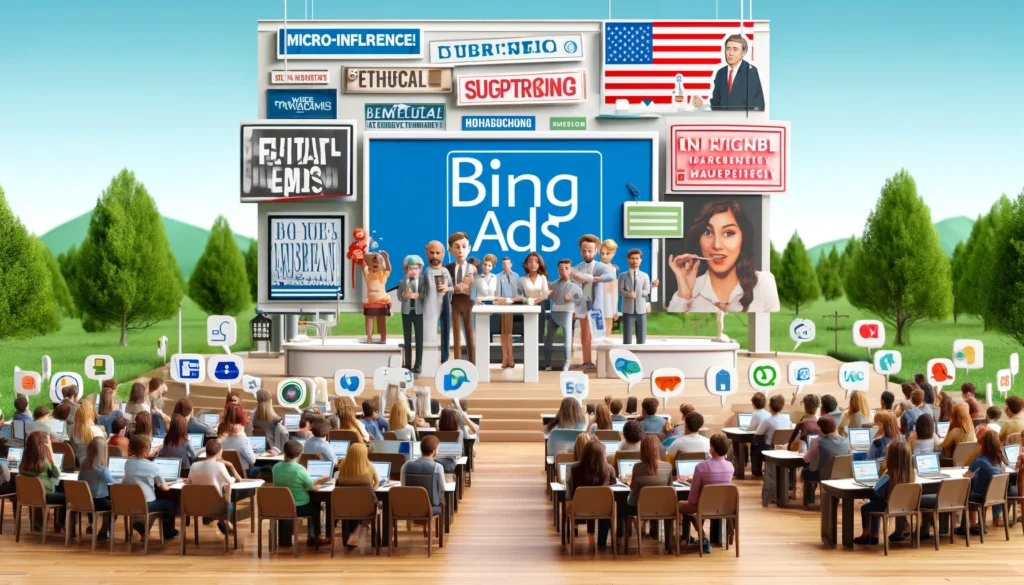Common themes:
- Importance of optimizing for search engines and AI (SEO, structured data, organic SEO).
- Emphasis on user experience and mobile optimization.
- Need for authenticity, personalization, and digital engagement in marketing.
- Utilization of social media and data analytics for targeted campaigns.
- Continuous adaptation to algorithm changes and trends.
- Building trust and credibility through transparency and quality content.
Surprising points:
- Specific focus on Generation Z’s unique preferences and mobile-first approach.
- Introduction of Bing Ads specifically tailored for educational institutions.
- Use of micro-influencers and alumni stories to build trust.
- Highlighting the ethical implications and transparency of digital ads in political campaigns.
- Emphasis on regular updates and monitoring for maintaining SEO effectiveness.

How to Optimize for SGE, Google’s AI Feature | Carnegie—Higher Ed Marketing & Enrollment
Carnegie—Higher Ed Marketing & Enrollment
Synopsis:
- The article discusses the importance of optimizing higher education websites for Google’s AI-Powered Search Generative Experience.
- It explains how AI-powered search is changing the way search results are generated and presented to users.
- The author provides insights on key elements to consider when optimizing websites for this new search experience, including structured data, content organization, and user experience.
- They emphasize the need for higher education institutions to adapt to these changes and leverage AI-powered search to improve visibility and engagement with their target audience.
- The author includes examples and guidelines for implementing changes effectively.
Background resources cited:
- Google’s AI-Powered Search Generative Experience documentation.
- Case studies of higher education institutions successfully optimizing their websites for AI-powered search.
- SEO best practices and guidelines.
Unique or noteworthy positions:
- The author highlights the increasing importance of AI-powered search and its potential impact on organic search rankings for higher education institutions.
- They emphasize the need for structured data and schema markup to provide rich information to AI algorithms and improve search results.
- The author also suggests implementing natural language processing techniques and conversational interfaces to enhance user experience and engagement.
Summary with takeaways:
- Higher education institutions must optimize their websites for Google’s AI-Powered Search Generative Experience to improve visibility and engagement.
- Structured data, content organization, and user experience are crucial elements to consider.
- Adapting to AI-powered search can positively impact organic search rankings and improve user satisfaction.
- Implementing conversational interfaces and natural language processing techniques can enhance the overall user experience.
- Case studies of successful implementations and adherence to SEO best practices can guide institutions in achieving desired results.
“✨ Optimize higher ed sites for Google’s AI 🧠🤖 Use structured data 📈 Enhance with conversational interfaces 💬🌐 #HigherEdSEO #AIInEducation”
Tweet
SEO for Universities and Colleges
Higher Education Marketing
https://www.higher-education-marketing.com/blog/future-proofing-seo-for-universities-and-colleges
Future-Proofing SEO for Universities and Colleges
- The article discusses the importance of future-proofing SEO strategies for universities and colleges.
- It emphasizes the need to adapt to changing algorithms, search trends, and user behaviors.
- The author provides insights on how to optimize websites and content for improved visibility and organic rankings.
- The article includes background resources from industry experts and case studies from successful institutions.
- Noteworthy positions taken by the author:
- The importance of staying updated with search engine algorithm changes to maintain website rankings.
- The need to focus on user experience and mobile optimization to accommodate growing mobile search trends.
- Summary and takeaways:
- Future-proofing SEO involves continuous monitoring, adapting to algorithm changes, and optimizing for user experience.
- Key strategies include implementing technical SEO best practices, creating high-quality content, optimizing for mobile, and leveraging data and analytics.
- Universities and colleges should prioritize local SEO and Google My Business to target prospective students and engage with the local community.
- Building a strong backlink profile, utilizing social media platforms, and optimizing for featured snippets can provide additional SEO benefits.
- Higher education institutions must invest in ongoing SEO efforts and stay updated with industry trends to remain competitive in the digital landscape.
“🔍🎓 Stay ahead! Adapt to algorithm changes, optimize for mobile, and create quality content. 📈💡 #SEOstrategy #HigherEdMarketing”
Tweet

Understanding SEO and Organic Enrollment Growth – Archer Education
Archer Education
https://www.archeredu.com/hemj/organic-seo
Synopsis:
- The article discusses the benefits of organic search engine optimization (SEO) for websites.
- It highlights the importance of organic SEO in driving targeted traffic, improving visibility, and building trust.
- The author explains how organic SEO differs from paid advertising and emphasizes the long-term benefits of organic strategies.
- The article provides tips for optimizing website content and structure to enhance organic search rankings.
- It mentions the significance of keywords, meta tags, and quality backlinks in organic SEO.
- The author also emphasizes the need for regular updates and monitoring to ensure the effectiveness of organic SEO efforts.
Noteworthy Positions:
- The author emphasizes the importance of organic SEO as a cost-effective and sustainable long-term strategy.
- Organic SEO is portrayed as a means to establish authority and credibility in the competitive online landscape.
Takeaways:
- Organic SEO helps drive targeted traffic and improves website visibility in search engine results.
- It establishes a website’s credibility and authority, leading to higher conversion rates.
- Regular updates and monitoring are crucial for maintaining the effectiveness of organic SEO efforts.
“🌱 Boost visibility and credibility with organic SEO! 📊🔍 Drive targeted traffic and achieve long-term success. #OrganicSEO #WebsiteOptimization”
Tweet

3 Digital Ad Strategies for Success During Election Season | Carnegie—Higher Ed Marketing & Enrollment
Carnegie—Higher Ed Marketing & Enrollment
https://www.carnegiehighered.com/blog/digital-ads-during-election-season
Synopsis:
- The article discusses the significant role of digital ads during election season and how they have evolved over the years.
- It highlights the challenges faced by political advertisers in reaching the right audience and ensuring ad transparency.
- The potential impact of social media platforms and data analytics on election campaigns is explored.
- The article explores strategies used by political campaigns to optimize digital ad spending and maximize voter engagement.
- It mentions the importance of understanding regulations and ethical considerations when running political ads.
Background Resources:
- The Rise of Digital Politics: Online Engagement Patterns during the 2016 US Presidential Campaign – Katherine Haenschen, Daniel Kreiss, & Yasemin Irvin-Erickson
- Digitally Mediated Publics: Political Twitter, Networked Partisan Publics, and Digital Reflexivity – Shannon McGregor
Noteworthy Positions:
- The author suggests that digital ads provide a cost-effective and targeted way for political campaigns to reach potential voters.
- They argue that social media platforms have a significant influence on shaping political narratives and public opinion.
- The importance of transparency in political ads is emphasized, with calls for improved regulation and oversight.
Summary & Takeaways:
- Digital ads have become a crucial tool for political campaigns, allowing them to target specific demographics and optimize spending.
- Social media platforms play a significant role in shaping political discourse and mobilizing voters.
- Effective data analytics can help campaigns tailor their messages and reach a wider audience.
- Transparency in political ads is considered a fundamental aspect of democratic processes.
- Understanding the ethical implications of digital ad strategies is crucial for political campaigns.
“📱💻💡 Digital ads shape campaigns, mobilize voters. Social media, data, transparency, and ethics are key. #DigitalAds #ElectionSeason”
Tweet
Higher Education Marketing Strategies for Generation Z
Think Orion
https://www.thinkorion.com/blog/higher-education-marketing-strategies-for-generation-z
Synopsis:
- Generation Z students have unique characteristics and preferences when it comes to higher education.
- The article provides insights and strategies for higher education institutions to effectively market to Generation Z.
- It emphasizes the importance of authenticity, personalization, and digital engagement in marketing campaigns aimed at this demographic.
- The author suggests leveraging social media platforms, video content, and virtual campus tours to connect with and attract Generation Z students.
- They also recommend using influencers, alumni stories, and student ambassadors to build trust and credibility.
- The article highlights the significance of mobile-friendly websites and responsive design to appeal to Generation Z’s preference for mobile devices.
- Additionally, the author mentions the importance of highlighting career outcomes and providing clear information about programs and costs.
Background Resources:
- No background resources are cited in the article.
Unique or Noteworthy Positions:
- The article emphasizes the need for higher education institutions to showcase authenticity and transparency in their marketing strategies to appeal to Generation Z.
- It suggests using micro-influencers and employee advocacy programs as a way to engage with this demographic.
Summary and Takeaways:
- Higher education institutions must adapt their marketing strategies to cater to the preferences and characteristics of Generation Z students.
- Authenticity, personalization, and digital engagement are key factors in effectively marketing to this demographic.
- Leveraging social media, video content, and virtual tours can help connect with Generation Z.
- Building trust and credibility through influencers, alumni stories, and student ambassadors is crucial.
- Mobile-friendly websites and responsive design are essential for capturing the attention of this mobile-first generation.
- Highlighting career outcomes and providing clear program and cost information is important for Generation Z decision-making.
“🎓💻 Engage Gen Z with personalized strategies, social media, and influencers. Attract mobile-first students. #GenerationZ #HigherEdMarketing 📚📱”
Tweet

We tested Bing Ads. See the results — Little Foxes Marketing | Digital Marketing for Education
Little Foxes Marketing
https://www.littlefoxesmarketing.com/blog/bing-ads-for-education
Synopsis:
- Bing Ads launched a new feature called Bing Ads for Education, specifically designed to help educational institutions reach their target audience.
- This feature allows educational institutions to promote their programs and courses to prospective students using Bing’s advertising platform.
- Bing Ads for Education offers targeting capabilities, ad extensions, and reporting tools specifically tailored for the education industry.
- Educational institutions can utilize this feature to increase brand visibility, attract more students, and drive enrollments.
Background resources:
- Bing Ads for Education: Official Bing Ads blog post
Noteworthy positions taken by the author:
- The author emphasizes the benefits of Bing Ads for Education in reaching educational audiences effectively.
- The author highlights the importance of utilizing targeted advertising options and reporting tools to maximize campaign results.
- The author suggests that educational institutions should consider incorporating Bing Ads for Education as part of their marketing strategy.
Summary with Takeaways:
- Bing Ads for Education is a new feature that helps educational institutions target prospective students and promote their programs.
- This feature offers specific targeting, reporting, and ad extension options tailored for the education industry.
- By utilizing Bing Ads for Education, educational institutions can increase brand visibility, drive enrollments, and attract more students.
“🎓 Bing Ads: Reach your target audience and attract more students with specialized targeting and reporting tools. #BingAds #EducationMarketing 📚”
Tweet
